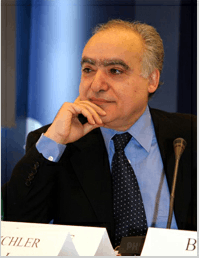Ghassan Salamé
| Ghassan Salamé | |
|---|---|
 | |
| Born |
1951 (age 66–67) Lebanon |
| Alma mater |
Saint Joseph University University of Paris |
| Occupation | Academic, diplomat |
| Spouse(s) | Mary Boghossian |
| Children | 2 daughters (including Léa Salamé) |
Ghassan Salamé is a Paris-based Lebanese academic. He served as the Lebanese Minister of Culture from 2000 to 2003. He was the Dean of the Paris School of International Affairs (PSIA) and professor of International Relations at Sciences Po. On 22 June 2017, Salamé was appointed Head of the United Nations Support Mission in Libya, replacing Martin Kobler.[1]
Early life and education
Ghassan Salamé was born in 1951 in Lebanon. He studied public law (Saint Joseph University, University of Paris); literature (PhD in humanities, Paris III Sorbonne-Nouvelle University); and political science (PhD, Paris I Panthéon-Sorbonne University). Salamé is a Christian.[2][3]
Career
Ghassan Salamé taught international relations at the American University of Beirut and Saint Joseph University in Beirut and, later, at the University of Paris.
In 2000-2003, Salamé was Lebanon’s Minister of Culture, as well as Chairman and Spokesman of the Organization Committee for the Arab Summit (March 2002) and of the Francophone Summit (October 2002) in Beirut.
Salamé presently sits on the board of the International Crisis Group (Brussels), the International Peace Institute (New York), the Open Society Foundations, the Bibliotheca Alexandrina (Egypt), and several other non-profit organizations. He was also the senior advisor to the United Nations Secretary-General from 2003 to 2006 and again in 2012. He was the political advisor to the United Nations Assistance Mission for Iraq (UNAMI) in 2003, where he played a critical role in bringing together Iraqi factions.[4] He is the chairman of the Arab Fund for Arts and Culture.[5] Salamé also sat on the Board of the Centre for Humanitarian Dialogue from 2011 to 2015.[6] In 2016, he joined the Commission on the Rakhine State (Myanmar), which was chaired by former UN Secretary General Kofi Annan.[7]
Salame is a Member of the Global Leadership Foundation (chaired by FW de Klerk) that works to support democratic leadership, prevent and resolve conflict through mediation and promote good governance in the form of democratic institutions, open markets, human rights and the rule of law.
On 5 August 2017, he made his first official visit to Libya after assuming the role of the head of UNSMIL by arriving at Mitiga Airport in Tripoli.[8][9]
Bibliography
Ghassan Salamé is the author of (inter alia) Quand l’Amérique refait le monde; Appels d'empire: ingérences et résistances à l'âge de la mondialisation; State and Society in the Arab Levant, and editor (inter alia) of Democracy Without Democrats: Politics of Liberalization in the Arab and Muslim World; The Politics of Arab Integration and The Foundations of the Arab State. His essays have been published in Foreign Policy, Revue française de science politique, European Journal of International Affairs, The Middle East Journal and other scholarly journals.
Selected Public Speeches and Articles
- Les raisons des révoltes arabes. Le Monde, 8 février 2011.
- Ghassan Salamé, poisson pilote des élites émergentes : l’ancien conseiller spécial de Kofi Annan, alors secrétaire général de l’ONU, dirige aujourd’hui la nouvelle Paris School of International Affairs de Sciences-Po. La Croix, October 21, 2010.
- Discours à l’ambassade du Qatar à Paris. Cérémonie honorant Hubert Védrine et Ghassan Salamé, September 22, 2010.
- Middle Easts, old and new, presented at the Oil and Money Conference, London, October 21, 2009.
- A Clash of Norms, speech at the UN General Assembly on the 60th Anniversary of the Universal Declaration of Human Rights, New York, December 10, 2008.
Other activities
- European Council on Foreign Relations (ECFR), Member[10]
- Reporters Without Borders (RWB), Member of the Emeritus Board[11]
References
- ↑ "Secretary-General Appoints Ghassan Salamé of Lebanon Special Representative, Head of United Nations Support Mission in Libya". United Nations.
- ↑ Overdahl, Stian. "Can Salamé Bring Peace to Libya?". Retrieved 15 August 2017.
- ↑ Pearson, John. "Lebanon's Ghassan Salame appointed UN envoy to Libya". Retrieved 15 August 2017.
- ↑ "Libya: Lebanese Ghassan Salamé likely to replace outgoing Kobler". The North Africa Post. Retrieved 15 June 2017.
- ↑ "AFAC - Prestige Magazine". Prestige Magazine. 2016-01-06. Retrieved 2017-01-09.
- ↑ Centre for Humanitarian Dialogu. "The Centre for Humanitarian Dialogue welcomes two new Board members" (PDF). Centre for Humanitarian Dialogue.
- ↑ "After Four Months, UN Security Council Approves the New Libyan Envoy". La Voce di New York. Retrieved 22 June 2017.
- ↑ "New UN envoy to Libya arrives in Tripoli". The Libya Observer. 5 August 2017.
- ↑ "New UN envoy touches down in Tripoli for first talks in Libya". Libya Herald. 5 August 2017.
- ↑ Members of the Council European Council on Foreign Relations (ECFR).
- ↑ Emeritus Board Reporters Without Borders (RWB).